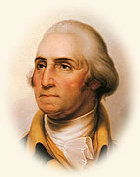
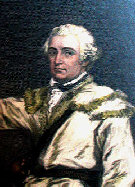
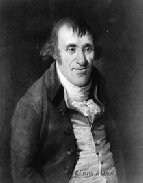
American Military
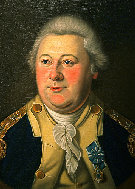
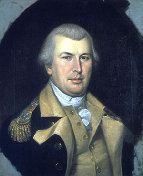
George Washington ~ Founding Father, First President of the United States & Commander-in-Chief of the American Colonial Army. A surveyor in civilian life, Washington began his military career during the French & Indian War & quickly became a senior officer despite a controversial encounter at Ft. Necessity, his retreat at the battle of Monongehela & an embarassing friendly fire incident during the Forbes Expedition. The lessons he learned during this experience would serve him well as Commander-in-Chief. He succeeded in driving the British out of Boston & was later defeated & chased from New York. After crossing the Deleware he won victories at Trenton & Princeton & retook New Jersey. His leadership, bravery & perserverance would result in America's ultimate victory at Yorktown. After the war he relinquished his command & became the only President to receive 100% of the electoral votes. As President he was offered a salary of $25,000 but turned it down. Washington proved an able administrator & managed to bring together opposing factions, unifying the fledgeling nation. He reluctantly served a 2nd term but refused a 3rd & retired to his home at Mt. Vernon. Washington was well aware of the precedent his administration would set & established many of the rituals in use today including the inaugural address & the title, "Mr. President".
America's frontier soldier, Daniel Morgan used his guerilla tactics to harry the British throughout the war. Morgan develeoped his hatred for the British after receiving 500 lashes for punching a superior officer while serving as a civilian teamster during the French & Indian War. The scars would serve as useful motivators to rally his men. Morgan's advantage was his grooved rifle which he & his marksmen, nicknamed "Morgan's Riflemen," used to frustrate the British killing first their Indian guides & then the British commanders creating chaos among their troops. Morgan was instrumental at the Battles of Saratoga & Bemis Heights. He displayed his brilliance as a tactician at Cowpens where he defeated the notorious "Bloody Ban" Tarleton. He was arguably the best field commander America has ever produced. Certainly none was ever more respected by his men.
Book seller turned soldier, it was Henry Knox who devised & carried out the plan to march to Ticonderoga & haul the six tons of artillery 300 miles back to Cambridge, bringing about the end of the Siege of Boston. He was made Chief Artillery Officer & joined Washington on most of his campaigns, established weapons manufacturing facilities & training centers for artillerymen. He was indespensible in establishing fortifications at Valley Forge.With the adoption of the U.S. Constitution, Washington appointed him our nation's first Secretary of War. Two army bases bear his name as does the U.S. Bullion Depository in Kentucky that stores the majority of the nations gold.
Farmer, businessman & co-founder of Vermont, Ethan Allen, along with his "Green Mountain Boys" led the raid on Ft. Ticonderoga. The fort was of little strategic significance but it's capture did yield the artillery needed to end the Siege of Boston.
Washington's most trusted commander was Major General Nathaniel Greene. He served first as Quartermaster General. He was put in command of the southern campaign after Gates' defeat at Camden at the behest of Alexander Hamilton who said, "For God's sake, overcome prejudice & send Greene!" The Marquis de Lafayette said of him, "...in the very name of Greene are remembered all the virtues & talents which illustrate the patriot, the statesman & the military leader..." Only Gates & Washington served all eight years of the revolution at the rank of General. The attitude of the revloution & indeed of America itself is best summed up by Gates' own words: "We fight, get beat, rise & fight again."
Click image to enlarge




